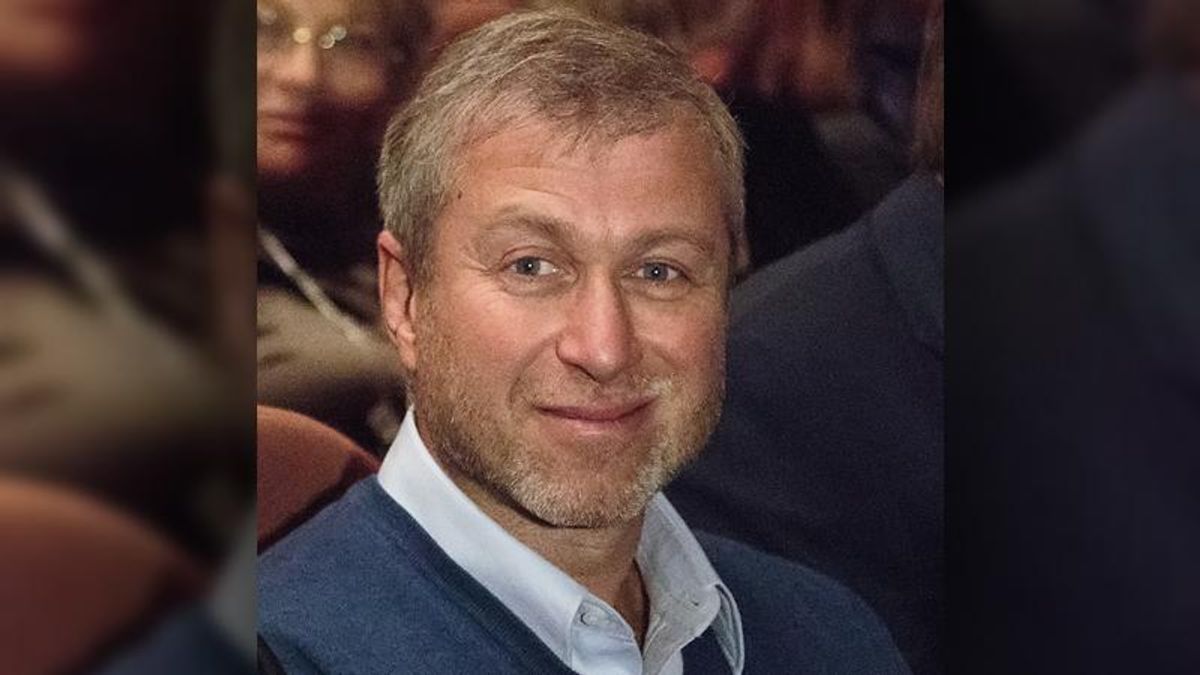
Russian oligarch Roman Abramovich has had a rough few weeks after sanctions were issued across the world, but particularly in the United Kingdom. It was reported Wednesday that the Justice Department is investigating $1.3 billion he reportedly has invested in financial firms. His life in Russia may have once been an isolated one, but his pathway to the west has been a lavish world with celebrities, yachts and a 15-bedroom mansion with its own missile defense system.
As NPR's "Planet Money" explained Tuesday, things are getting much worse. The European Union has now blocked Abramovich from traveling to its 27 member states. Meanwhile in the United States, "members of Congress are now calling on President Biden to sanction Abramovich, threatening his megamansion on the Upper East Side."
But it isn't only about sanctions. Angry activists in Spain chartered their own boat to access Abramovich's superyacht, Solaris, and graffiti it. They failed in the endeavor, but Abramovich took the hint, sending his two superyachts to head east, away from any other possible angry protesters. He has another superyacht, but it remains in place.
"Abramovich, himself, has fled east for safety, back home to Russia, which seems to be one of the few nations where he's welcome these days," the report explained.
READ: Jim Jordan’s own troubling history resurfaces after his 'don't forget' tweet about Brett Kavanaugh
The current class of ultra-wealthy citizens in Russia largely replaced others from the 1990s. Russian President Vladimir "Putin began purging oligarchs and anointing his own oligarchs in an effort to fortify his reign. However, the power structure remains the same," the report explained. Their rise is a key piece to understanding Putin's reign.
It was all part of a 1990s program former President Boris Yeltsin implemented as the Soviet Union transitioned from communism into a market-based capitalist society.
"Yeltsin turned to the Russian economists Yegor Gaidar and Anatoly Chubais, who, with the aid of Western advisers, hammered out the details," the report explained. "There were many economists — including even Gaidar and Chubais themselves before they became government officials — who believed that the transition to capitalism would best be handled gradually. They knew the transition would be complex and painful, and it made sense for Russia to first create the institutions that healthy, competitive markets need to flourish — like independent courts, functioning capital markets, and strong regulatory bodies."
After an attempted coup in August 1991, however, Yeltsin feared time wasn't an asset and created the "shock therapy" program, which essentially unleashed a market "to electrocute the old Soviet system and jolt Russia into embracing capitalism."
While some claimed that Russia would be fine, Harvard economist Jeffrey Sachs "believed such a radical program needed support. He proposed the United States and multilateral development agencies help Russian reformers succeed with a $30 billion aid package, akin to what America had provided Europe after WWII with the Marshall Plan. Sachs also called for the cancellation of Russia's debts. But these ideas were rejected by American leaders," the report explained.
Meanwhile, mass privatization of state-run businesses was ushered in. Using a voucher given to 148 million Russian citizens, the first class of oligarchs was born. Desperately poor people suffering under hyper-inflation sold off their vouchers and the new oligarchs were able to pool them into their own private empire.
As the Russian economy slid into disaster, the government offered a "Loans for Shares" plan.
The secret plot basically worked like this," the guide explained, "the richest oligarchs loaned the government billions of dollars in exchange for massive shares of Russia's most valuable state enterprises. When the government defaulted on paying back the loans, as the schemers expected they would, the oligarchs would walk away with the keys to Russia's most profitable corporations. In exchange, the government would get the money it needed to pay its bills, privatization would keep moving forward — and, most importantly, the oligarchs would do everything in their power to ensure Yeltsin was reelected."
Mining, steel, shipping and oil companies were all auctioned off to the highest bidder. Boris Berezovsky and his protégé, Roman Abramovich, "got a large stake in the oil company Sibneft for about $200 million. In 2009, when Putin renationalized the company, Abramovich sold his stake back to the government for $11.9 billion."
As Yeltsin's health deteriorated, the oligarchs began looking for his successor. They agreed on the obscure former KGB officer, Vladimir Putin. They thought he was loyal and would look after their interests. Instead, they created a monster.




